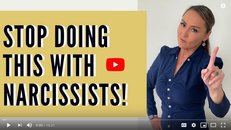Divorcing a narcissist is likely one of the most challenging things your friend has ever done. It will also be one of the most significant. You want to support her,* but hardly know what to say.

(Pixabay / Free-Photos)
This article outlines seven comments to avoid when communicating with a friend who is divorcing a narcissist, along with a few suggestions for comments that will actually help.
1. Don’t Say – “I know just how you feel.”
Especially if you have never married – or divorced – a narcissist, please do not say this to a friend. Narcissists usually appear reasonable and normal to people outside the relationship. Your friend, however, is not dealing with a rational person who acts in predictable ways.
Because the narcissist appears high-functioning in public, you might imagine that your friend is over-reacting or that things can’t really be as bad as your friend says. You may imagine that the narcissist deals with your friend similarly to how he interacts with you and other acquaintances in public. In private, the narcissist engages your friend in mind-games and emotional off-loading that is impossible for your friend to fully describe.
Instead, say, “How are you feeling?”
2. Don’t Say – “He seemed like such a nice guy.”
The narcissist probably was a nice guy whenever you were around. That does not mean, however, that he continued to be a nice person behind closed doors.
Narcissists might not yell, cheat, gamble, or indulge in physical addictions. A narcissist’s poisoned version of reality can be impossible to observe from outside the marriage relationship.
Your friend, in recovery from an intimate relationship with a narcissist, is already dealing with moments of self-doubt. She probably questions, at times, whether to believe her version of reality or the narcissist’s. Don’t make it harder. Narcissists in intimate relationships insist that their version of reality is the only one that counts.
Similarly, don’t say – “He always seemed ‘off’ to me. I’m glad you are moving on.”
While it may be true that you mistrusted the narcissistic from the beginning, this is not a helpful response. Comments like this might sting your friend, who already blames herself for more than her fair share of the relationship problems. It won’t help your friend if you cast doubt on her ability to judge another person’s character.
3. Don’t Say – “I hear you. My partner leaves his socks around, and it drives me crazy, too.”
Comparing your daily struggles with your friend’s divorce minimizes her experience. If you want to help at a crucial time, don’t use your friend’s divorce as a pass for you to complain about your own marriage.
For many people, nothing communicates caring better than sincere questions. After asking a question, be sure to wait long enough for your friend to formulate her thoughts before you blast onto describing your own life. Even a good friend may need two or three sincere questions before they comprehend that you are sincerely ready to listen.
4. Don’t Say – “I would never divorce; I believe in working things out.”
Relationship experts observe that comments like this can be unnecessarily cutting and shaming to someone going through a divorce. Most people who get divorced likely felt this way earlier in the relationship.
As an outside observer, even if you are a canny or long-time friend, recognize that you have limited insight into your friend’s marriage relationship. If the ex is a narcissist, you have an even lower chance than normal at guessing the extent of the problems.
Narcissists often appear smooth in public, while privately using their intimate partner as a crutch, to prop them up. The narcissist takes advantage of his partner’s desire to please him, but this rarely plays out in front of friends.
Instead, say, “I respect you. I respect the fact that you’ve had to make some tough decisions.”
5. Don’t Say – “Your poor kids.”
Your friend knows that divorce is hard on kids. In fact, she probably put off this divorce for months or years in a valiant attempt to shield her kids from this challenge. Your friend has probably spent a lot of time worrying about how her kids will cope, especially if there is no outward or easily-explained reason for the divorce.
If the husband is cheating, it’s easy to explain to in-laws and neighbors why your kids will be better off after a divorce than before. Divorcing a narcissist, however, is not so easy to explain.
The narcissist’s manipulation and emotional hijacking may be making your friend into a shell of her former self, but our culture doesn’t have the vocabulary to explain such emotional abuse quickly.
It will be easier for the kids to thrive when your friend is thriving.
Say, “You will make it through this.” “Your kids will make it through this.”
Say, “I’ll be here for you.”
Say, “I admire you making difficult decisions for the sake of your kids.”
6. Don’t Say – [Nothing]
Don’t say nothing. If you are afraid of saying the wrong thing, don’t just skip over the divorce and move on to tomorrow’s carpool or the weather.
If you are afraid of saying the wrong thing, why not say that? “I wish I knew the perfect thing to say, but I don’t.” “I don’t know how to support you in the best way, but I will not give up trying.”
Women whose marriage relationships end because of the husband’s death receive society’s approval to move through a grieving process. Neighbors bring meals. Co-workers write cards and make small donations. Family members express solidarity and offer to help with the kids. Days, weeks, and months later, condolences are offered. Friends comment on the strength of the grieving partner to carry on in a tough situation.
Unfortunately, when a women’s marriage relationship ends because of divorce, our society doesn’t naturally create space for a similar grieving process. Why not support your divorced friend the same way you’d support that friend if her husband died?
If your friend’s ex is an unrepentant narcissist, her marriage partnership died just as effectively as if her husband had been killed in an accident.
7. Don’t Say – “Call if you need anything.”
Of course, a friend who is going through a divorce needs things. Saying, “Call if you need anything” can highlight the fact that you don’t know what your friend needs, and you don’t have the time to find out.
Muster courage to insert yourself into your friend’s life in a supportive way. Think of specific things you can offer instead of the vapid “anything.”
Say, “I’m dropping by the dry cleaner tomorrow. How about I swing by tonight to pick up any items you might have?”
Say, “I’d love to be a sounding board while you’re adjusting to a new life. Would you like to set up a regular lunch date?”
Video
____________
*For clarity, this article will refer to your friend as “she” and the narcissist as “he.” There are certain forces at play in our culture that make this gender pattern more prevalent. However, gender norms are shifting rapidly. There are, and always have been, relationships in which the narcissistic is female, and the partner is male.












